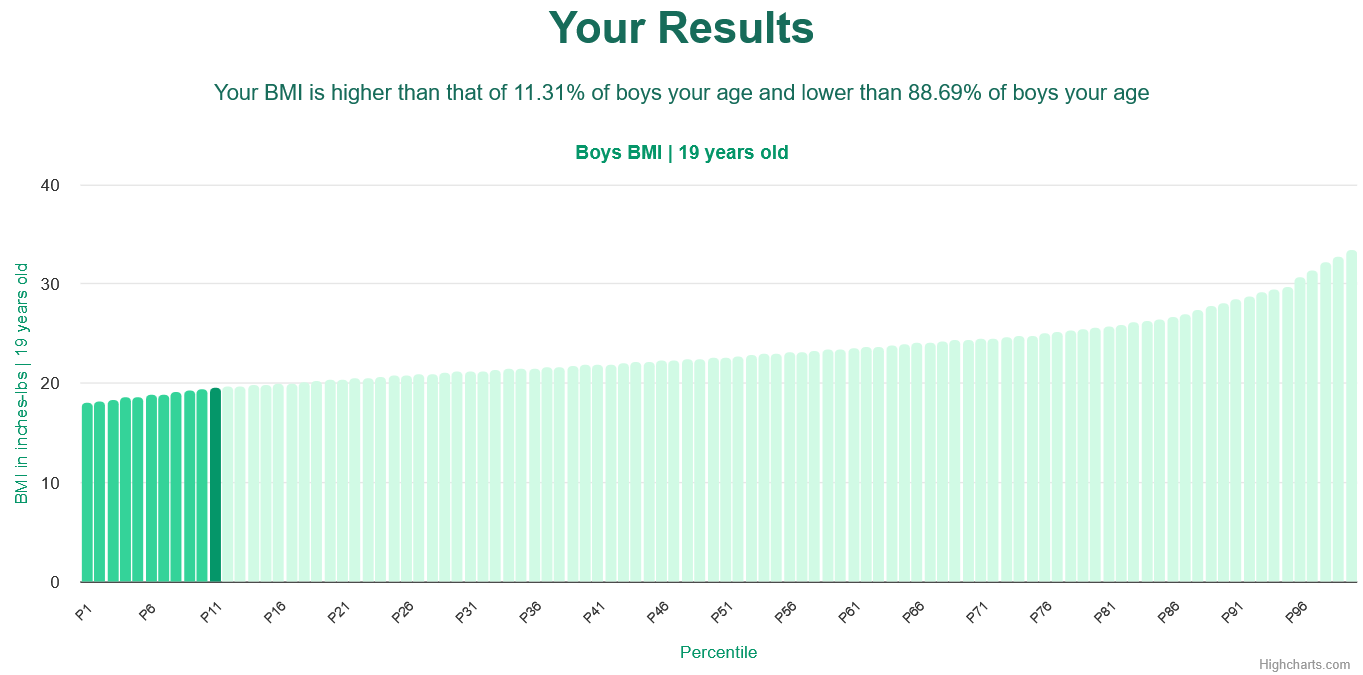Boys BMI chart for Teenagers 19 years old

General Summary: 19 years old boys BMI
In most cases, BMI measurements for 19 years old boys will be in the range between 18 and 31 cms and kgs. The average BMI for 19 years old boys is 23 cms and kgs, according to the CDC and anonymized data from users.
All Results
Enter your BMI measurements above to see how they compare
So far, we have recorded [0] BMI measurements for 19-years-old boys on LifeMeasure!
(chart updates daily)
Understanding BMI in 19-Year-Old Boys
What is BMI? Body Mass Index (BMI) is a measurement tool used to assess body fat based on height and weight. For teenagers and young adults, BMI is interpreted using percentiles that account for age and gender differences.
BMI Categories for 19-Year-Old Boys
According to the Centers for Disease Control and Prevention (CDC), BMI for 19-year-old boys falls into the following categories:
Underweight: BMI less than the 5th percentile
Healthy weight: BMI between the 5th and 85th percentiles
Overweight: BMI between the 85th and 95th percentiles
Obese: BMI greater than the 95th percentile
Factors Affecting BMI in 19-Year-Old Boys
Several factors influence BMI at this age, including:
Genetics: Family history plays a role in body composition and metabolism.
Diet and Nutrition: A balanced diet with proteins, healthy fats, carbohydrates, and micronutrients supports proper growth and weight management.
Physical Activity: Engaging in at least 60 minutes of moderate to vigorous exercise daily helps maintain a healthy BMI.
Metabolism: Individual metabolic rates impact how efficiently the body processes food.
Lifestyle and Sleep: Proper sleep (7-9 hours per night) and active lifestyle choices contribute to maintaining a stable BMI.
Hormonal Changes: At 19, boys continue to experience hormonal fluctuations that may affect weight and muscle development.
Healthy Lifestyle Tips for 19-Year-Old Boys
Maintain a Balanced Diet: Include lean proteins, whole grains, fruits, and vegetables while limiting processed foods and sugary drinks.
Stay Active: Strength training, cardio workouts, and recreational sports help maintain a healthy BMI.
Monitor Portion Sizes: Eating appropriate portions prevents excessive calorie intake.
Get Enough Sleep: Quality sleep supports metabolism and overall well-being.
Stay Hydrated: Drinking plenty of water helps regulate body functions and energy levels.
Recent Trends in BMI Among Young Adults Recent studies indicate that lifestyle choices, screen time, and dietary habits significantly impact BMI trends among young adults.
By monitoring BMI and adopting healthy habits, 19-year-old boys can support their long-term health and fitness.
See more ages